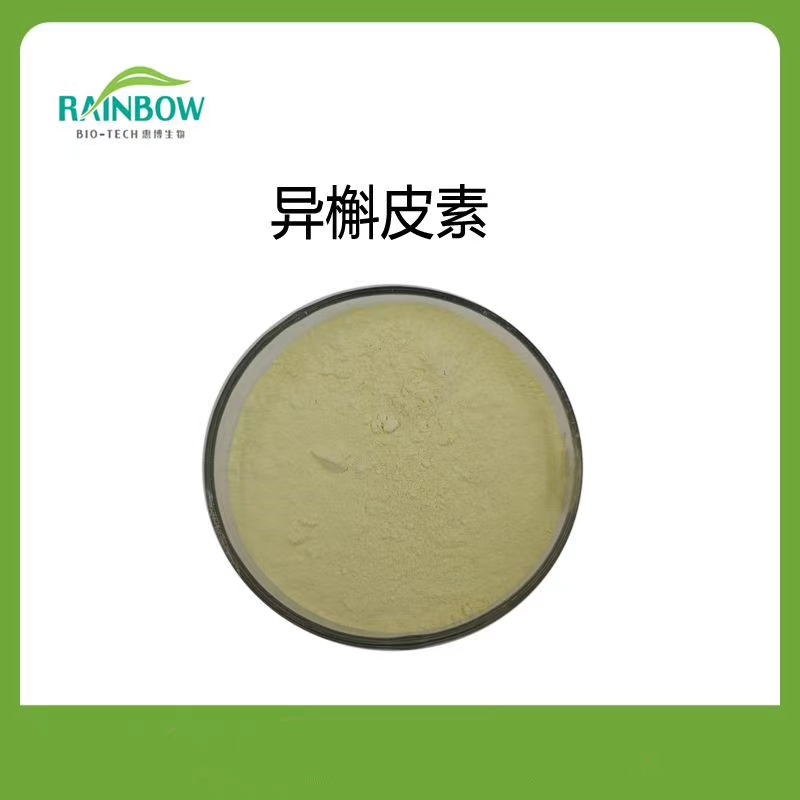Isoquercitrin, also known as isoquercetin glycoside or quercetin-3-O-glucoside, is a natural flavonoid glycoside compound. Its chemical name is 3,3 ‘,4 ‘,5, 7-pentahydroxyflavono-3 -β -glucoside, with the molecular formula C₂₁H₂₀O₁₂ and a molecular weight of 464.38. CAS registration number: 482-35-9. The following is a systematic review of its core information from multiple dimensions:
一: Physical and Chemical Properties
l Appearance: Yellow crystals (in water or ethanol solution), melting point range: 206-237℃ (slight variations in different literature), boiling point: 872.63℃, density: 1.879g /cm³, flash point: 307.47℃.
l Solubility: Extremely low water solubility (< 0.1g/100mL at 21℃), slightly soluble in boiling water, turns deep yellow when dissolved in alkaline solutions, and has good solubility in ethanol.
l Stability: Sensitive to light and heat, it should be stored in a sealed, dry and dark container, and avoid contact with strong acids and strong alkalis
Ii. Sources and Preparations
1:Natural extraction
l Plant source: It is widely present in the flowers, leaves, fruits and stems of leguminous plants such as Sophora japonica, malvaceae plants such as cotton grass, and Apocynaceae plants such as red hemp, among which Sophora japonica has the highest content.
l Extraction process: Traditional methods include solvent extraction and acidic hydrolysis, but they are inefficient and produce by-products. Modern technology enhances yield and purity through enzymatic hydrolysis methods (such as snail enzyme, recombinant α -L-rhamnosidase) or microbial fermentation (Bacillus subtilis metabolic engineering).
2:chemical synthesis
l It is synthesized by the reaction of quercetin with a glucose-based donor, but it is costly and has fewer industrial applications。
Iii. Pharmacological Effects and Clinical Applications
1:cardiovascular protection
l Expectorant, antitussive and antiasthmatic: Clinically used in the treatment of chronic bronchitis, it relieves airway spasm by inhibiting the release of inflammatory factors.
l Auxiliary blood pressure and lipid reduction: Improve vascular endothelial function in patients with coronary heart disease and hypertension, and lower lipid levels.
l Research data: Animal experiments have shown that isorhamnetin can reduce systolic blood pressure in hypertensive rats by 15% to 20%。
2:metabolic regulation
l Blood sugar control: A study by China Medical University found that isorhamnetin in okra can inhibit the activity of intestinal α -glucosidase, delay the absorption of carbohydrates, and reduce the blood sugar level of diabetic patients from 163.4mg/dL to 141.0mg/dL within 8 weeks.
l Cholesterol management: By inhibiting the expression of cholesterol absorption-associated protein (NPC1L1), it reduces the level of serum low-density lipoprotein (LDL-C).
3:liver protection
l Drug-resistant liver injury: By activating the Nrf2/ARE pathway and upregulating the expression of antioxidant enzymes (SOD, GSH-Px), it alleviates hepatocyte necrosis induced by acetaminophen.
l Non-alcoholic fatty liver disease: Activate the AMPK and PPARs pathways, reduce liver lipid deposition, and improve insulin resistance.
4:Anti-cancer potential
l Induction of apoptosis: Apoptosis of breast cancer MCF-7 cells is induced through the mitochondrial pathway (releasing cytochrome C and activating caspase-3).
l Inhibiting metastasis: Down-regulating the expression of matrix metalloproteinases (MMP-2/MMP-9) to block the invasion of lung cancer A549 cells
Health investment lies in precision and efficiency. Isorhamnetin, this “life gem” derived from plant wisdom, is becoming a new favorite in the field of modern nutritional science with its outstanding absorption efficiency and all-round health protection capabilities. It is not merely an ingredient, but rather a positive and forward-looking attitude towards a healthy lifestyle.
Contact:Judy Guo
WhatsApp/we chat :+86-18292852819
E-mail:sales3@xarainbow.com
Post time: Oct-27-2025


